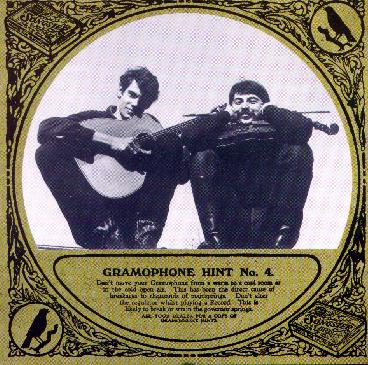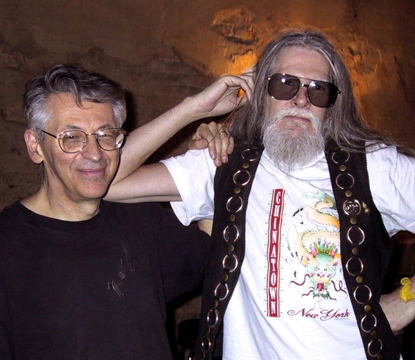


|
 |
| Weber / Stampfel | Stampfel / Weber |
Peter Stampfel (b. Oct. 29, 1938, Milwaukee, Wis.), banjo, fiddle, voc.;
Steve Weber (b. June 22, 1942, Philadelphia, Pa.), gtr., voc.
The Holy Modal Rounders, a loose group centering on Peter Stampfel and Steve Weber, are gonzo traditionalists who mix folk and bluegrass tunes with their own bouncy, absurdist free associations. The Rounder's closest brush with commercial success came when their "If you Wanna be a Bird" appeared on the Easy Rider soundtrack, but such songs as "Boobs a Lot" and "My Mind Capsized" kept folk rock from taking itself too seriously. Stampfel was previously with groups like MacGrundy's Old Timey Wool Thumpers. He and Weber met in 1963 on the East Coast. They recorded albums for Prestige and then began working with the Fugs and contributed to the Fugs first record on the Broadside label.
In 1965 the groups went their separate ways; Stampfel formed the Moray Eels, and Weber revived the Rounders moniker and added other musicians for the first time (including playwright Sam Shepard, who played drums and wrote songs) for Indian War Whoop on ESP. They also scored Shepard's play Operation Sidewinder. Around the same time, the group's freewheeling lineup included Jeff "Skunk" Baxter, later with Steely Dan and the Doobie Brothers. In the early Seventies their Good Taste is Timeless, featuring "Boobs a Lot," got some FM airplay. Shortly thereafter, Fantasy Records released Stampfel and Weber, followed in 1976 by a reunion LP, Alleged in their Own Time, on Rounder Records (named in their honor). In late 1981, still folk-cult favorites, Stampfel and Weber did some East Coast dates as a duo to support Goin' Nowhere Fast, and Stampfel continued to appear around New York City with his group, the Bottlecaps. Stampfel now works in publishing in Manhattan and has recorded several albums with the DuTels and the Bottlecaps.
The Holy Modal Rounders were almost the very definition of a cult act. This isn't a case of a group that would be described by such cliches as "if only they got more exposure, they would certainly reach a much wider audience." Their audience was small because their music was too strange, idiosyncratic, and at times downright dissonant for mainstream listeners to abide. What makes the Rounders unusual in this regard is that they owed primary allegiance to the world of acoustic folk -- not one that generates many difficult, arty, and abrasive performers.
The Holy Modal Rounders were not so much a group as a changing aggregation centered around the two principals, Peter Stampfel and Steve Weber. When the pair got together in 1963, the intention was to update old-time folk music with a contemporary spirit. As Stampfel told Folk Roots in 1995, "The Rounders were the first really bent traditional band. And the first traditionally-based band that was not trying to sound like an old record." They weren't the only musicians in New York thinking along these lines, and Stampfel and Weber contributed heavily to the first recordings by a similar, more rock-oriented group, the Fugs.
The Rounders began recording in the mid-'60s for Prestige as an acoustic duo. Even at this early stage, they were not for everybody. Although clearly accomplished musicians, and well-versed in folk traditions, they were determined to subvert these with off-kilter execution and strange lyrics that could be surreal, whimsical, or just silly. They outraged folk purists by simply changing melodies and words to suit their tastes on some of their cover versions of old standards; Stampfel once wrote in the liner notes that "I made up new words to it because it was easier than listening to the tape and writing words down."
On their 1967 LP Indian War Whoop, Stampfel and Weber added other musicians, including playwright Sam Shepard on drums (Shepard also wrote some material). The resulting chaos was just as inspiring, but both material and performance improved on 1969's Moray Eels Eat the Holy Modal Rounders. This addled combination of folk and psychedelia was their most inventive work, and featured their most famous song, "If You Wanna Be a Bird" (which was used on the Easy Rider soundtrack).
The haphazard style of the Rounders perhaps militated against any sort of stable lineup (Jeff Baxter, later to play with Steely Dan and the Doobie Brothers, was one of the musicians that passed through the group briefly in the 1960s). Good Taste Is Timeless, in the early '70s, was engineered in Nashville by legendary Elvis Presley guitarist Scotty Moore, and generated one of their most renowned songs, "Boobs a Lot." Shortly afterwards, Stampfel and Weber separated for a time, although they reunited in 1976 for Alleged in Our Own Time on Rounder. By this time the Rounders were more of a concept than an ongoing group, and 1979's Last Round was recorded with various musicians that had been part of the group at some point. 1981's Goin' Nowhere, billed just to Stampfel & Weber, was their last recorded joint partnership.
Stampfel has been much more visible as a solo recording artist than Weber, acting as a key contributor to Michael Hurley's critically lauded Have Moicy! in 1976. He's been recording on his own since the mid-'80s, sometimes with the Bottlecaps, in a fashion that keeps the spirit of the Holy Modal Rounders alive without sounding embarrassingly revivalist.
The first Holy Modal Rounders record was one of the best in the history of the folk revival. Peter Stampfel and Steve Webber were not traditionalists along New Lost City lines, nor did they fit in the "contemporary" camp of singer/songwriters. What they managed to do, so well that it seemed perfectly natural, was to graft a hip, urban sensibility onto a traditional framework. That these young Greenwich Villagers should be informed by the beat movement is no wonder, nor is their interest in folk music. But they were alone in writing additional lyrics to old songs that were true to the spirit of Appalachia and also to the existential/beat aesthetic. "Hey little leaf, lying on the ground, now you are turning slightly brown. Why don't you hop back up on the tree, turn the color green the way you oughta be?" Their vocals were raw, and the guitar, fiddle, and banjo effective -- they made every note count, which is more important than virtuosity. The second record was not quite as successful but still great, and then the Rounders entered into sort of an acid folk-rock period where the succinctness of their earlier expression was set aside for a higher degree of sheer wackiness.
Later Rounders records featured other musicians, including Weber's old friend Michael Hurley and bassist Dave Reisch (a fixture since 1971). If they didn't quite recapture the magic of early days, the boys never lost their unique appeal. Their first new release in 20 years coincides with the Fantasy reissue of their first two records (with two unissued fiddle tunes with words, "Sugar in the Gourd" and "Soldier's Joy"). They pick up right where they left off, with bent folk-country plaints, Rounderized trad tunes, original bubble-gum, a Hurley number ("Tea Song"), and a couple of remakes (including "Euphoria"). They probably shouldn't have tried Doc Watson's "Long Journey"; most successful Rounders slow songs depend on at least a little irony, an approach that obviously wouldn't be appropriate here. But everything else works, and there are some real gems, like "Skin Game," which features Webber's now-husky vocals and fine blues guitar and some nice slide work by Dan Rooke.
Their first two albums for Prestige, which were later reissued by Fantasy, were a fine collection of their material at that time. The first, for example, included their own interpretations of traditional songs like "Give The Fiddler A Dram" and "Cuckoo;" innovative covers of "Blues In A Bottle" (originally recorded by Prince Albert Hunt's Texas Ramblers in the 1930's), and Charlie Poole and The North Carolina's Ramblers' "Hesitation Blues" as well as Weber's rehash of "Mr. Bass Man," rewritten as "Mr. Spaceman." Stampfel and Weber also appeared on the first Fugs albums - they knew Ed Sanders from Greenwich Village. Stampfel also contributed to many local magazines and fanzines throughout his career.
However, in 1967 Stampfel put together a new band The Moray Eels which included Shepard, Tyler and Antonia (a long time friend of his). Sam Shepard was arguably one of America's best post-war playwrites and was also a film star, appearing in The Right Stuff and Jessica, for example. He also wrote the screenplay for Zabriskie Point. Later in the same year, Stampfel also united with Weber to record Indian War Whoop. It's a weird acid-folk album with no gaps between tracks and is not that good. Tyler did not play on this album and Lee Grabtree came in on keyboards.
Their 1968 album was made for Elektra in Los Angeles and included Californian bassist, John Wesley Annis. This, too, was a bit of a disaster and poorly produced. lndeed it took them a while to secure another recording contract, although eventually they wound up with Metromedia in 1971. The result Good Taste Is Timeless was a bit bland, although it had a few good cuts like "Spring of '65" and "Boobs A Lot." It was disasterously re-mixed in New York by a group of stoned hippies who had not noticed that one of their speakers was malfunctioning. Metromedia went bust and further line-up changes were made.
The line-up for their 1975 album was Stampfel, Weber, Robin Remailly, Luke Faust (ex-Insect Trust), Richard Tyler, Dave Reich and Karen Dalton. This album, which contained good material and was well produced, is recommended. In fact the album had been recorded two years earlier, but its release was delayed.
In the period that followed Stampfel formed The Hoochie Koochie Dream Band and then, in late 1974, The Unholy Modal Rounders, who together with Michael Hurley and friends recorded the Have Moicy album, which was one of their better efforts and superior to Last Round, which was actually recorded in 1976.
1978 brought forth a Stampfel-Weber acoustic reunion album, which is more in the style of their first two Prestige albums, whilst 1999's Too Much Fun included Dave Reich. Stampfel and Weber still gig occasionally, mainly in NYC.
The Holy Modal Rounders were one of rock's most diverse and experimental bands.
Discography:
- The Holy Modal Rounders, Vol. 1 (1964) - Prestige
- Holy Modal Rounders, Vol. 2 (1965) - Prestige
- Indian War Whoop (1967) - ESP
- The Moray Eels at the Holy Modal Rounders (1969) - Elektra
- Good Taste Is Timeless (1971) - Metromedia
- Alleged in Their Own Time (1975) - Rounder
- Last Round (1978) - Adelphi - reissued 2000 on CD with original liner notes, an update written by Peter Stampfel, lyrics, and three tracks that didn't fit on the original record, including the classic Snappin' Pussy.
- Goin' Nowhere Fast (1981) - Rounder
- Too Much Fun (1999) - Rounder
- Last Time Around - ?
- Weird Folk - ?
- Holy Modal Rounders, Vols. 1 & 2 (CD reissue), plus two songs (1999) - Fantasy
With Others:
- The Village Fugs (1965) - Broadside
- Virgin Fugs
(1967) - ESP- Have Moicy (1976) - Rounder (CD) - with Michael Hurley and Jeff Fredericks / Clamtones.
- I Make a Wish for a Potato (2001) - Rounder - classic recordings from the Rounders, Hurley, Jeff Frederick, the Bottlecaps.
Peter Stampfel solo:
- Peter Stampfel and the Bottlecaps (1986) - Rounder
- Peoples Republic of Rock and Roll (1989) - Homestead
- You Must Remember This (1994) - Gert Town
Steve Weber solo:
- Aren't they gone yet? (1989) - Rollin Donutz